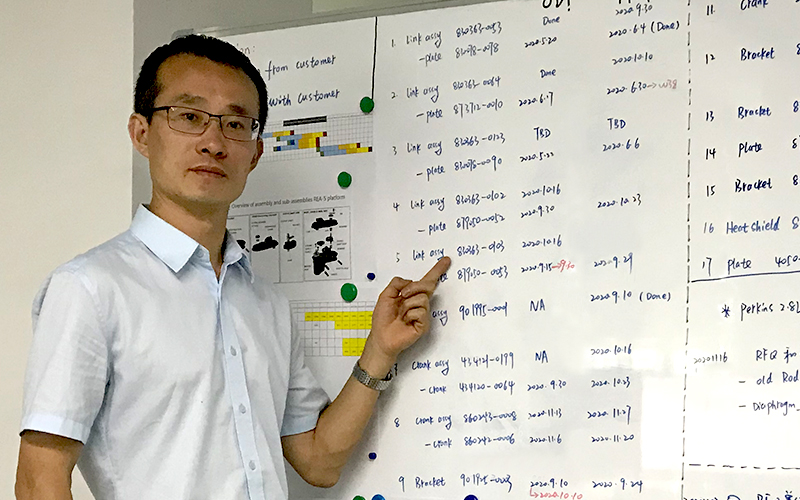First of all, please present to our readers your history with FAIST and your current role.
I joined FAIST Emission Control (Suzhou) Co. Ltd as a product engineer 9 years ago. I am happy for today’s progress of our company, and proud to have contributed in my youth to the process of the company's development. If I look back, the key moments of my career with FAIST have been in 2013, when FAIST Emission Controls was awarded a project which was the first that saw me in charge of developing a product technology interface between Italy and China. It was the first time we worked with a data matrix management process in our assembly lines, so a major milestone not only for my career, but also for us as a productive company.
Working for a multinational company has many perks. In 2014, I experienced my first business trip to Italy as application engineer and I still remember the day before my return in China: Leonardo Laganà, business director of the CPS Business Unit, invited me to eat what he considered the best Chinese food in Perugia… from his point of view! But I appreciated the effort. In 2016, FEC moved into a new building and I started my new role as a project manager and team leader, a big change and also a challenge for me. In 2018, I had the chance to participate in a fantastic team building activity at Ferrari Museum in Maranello; that same year, my role changed to program manager and I maintained the position of team leader. In 2020, the pandemic interrupted our mutual visits with our headquarters in Italy up to now, but the communication and cooperation between us never stopped.
Thanks to my experience, I deeply feel how important the culture of a company is, how crucial it is for employees' strengths to be given room in the company and how great it is for employees' contribution to be recognized by leaders and colleagues.
Being FAIST a global company, dealing with international clients, how is the Customer Team organized in terms of working with them?
There are mainly two groups of Customer Team worldwide, one located at our headquarters in Italy and the other in China. Key Account Managers, based in Italy, are the global interface for international clients; China Customer team is composed by program managers, application engineers and customer quality engineers, mainly in charge of Asian clients. Generally, though, customer team members sit all together in front of client for new projects, touching commercial discussions, project managements, technical points and quality aspects, according to their roles. What is key for us is the possibility to serve local or oversea clients with high level of autonomy and responsibility, but being part of a global company, support from each other is unavoidable.
When does the global team get involved? Do you define a strategy together and then deploy it on your own?
In short, the focus of the global team is to share know-how. We mainly exchange experiences and we analyse together projects based in China but with a global footprint. We fix a global strategy in order to achieve the company targets and to satisfy our customers, but as I previously stated, we are free to define our internal strategy if it helps to achieve better commercial and technical results.

How do you ensure that the team is always up to date with the latest technologies and able to answer to, or even predict, the needs of our customers?
We receive a regular training on technologies, we participate in international summits where we see trends of the market and next-generation developments; and obviously we are always in touch with our customers and their expectations from FAIST.
It would be quite difficult to stand firmly in the fierce competition of our business and it’s quite easy to be eliminated by the market, if an enterprise doesn’t have state-of-the-art technical capabilities. From my point of view those capabilities are the life of any company and there will be no future if an enterprise doesn’t have its own technical capabilities: a right core strategy and excellent management will ensure that for FAIST.
How do you ensure a continuous flow of know-how between the Chinese and the European-based development teams?
Regular communication, visits and training aimed at sharing know-how will ensure a continuous flow between both sides. In addition, we have a strong bond which results also in a steady “informal” communication channel for questions or doubts that may arise at any moment.
And what about the now common practice in the automotive world of continuous improvement: how is it deployed in FAIST Emissions Control?
We update regulations, achievements of our operations and lessons-learned in a shared document in terms of Customer Team activities and we also have Kaizen activities, and 6 sigma activities in all our plants; these activities definitely help reducing customer-side risk.
We also spend time with manufacturing, production and quality colleagues to understand how and what to do to improve in the plant. We usually create an internal improvement plan that drives us in the direction of increasing our efficiency and allowing also to our customers to have an advantage in terms of price reduction, value engineering projects and so on.
The new line of products of FAIST CPS, electric actuators, has seen the company awarded with many projects also in the Asia-Pacific region; what have been the main challenges in this process and how did you manage to overcome them and provide a suitable answer to the customers’ needs?
The introduction of the new products has been the main worldwide challenge for FAIST; in China we have suffered a bit more due to the virus that has stopped the possibility to travel and to be in direct contact with the matter, and where the action is at the moment; in any case, using video calls, specific meetings and daily exchange of information we succeeded in going over this “last mile” issue and we have created a substratum of knowledge in our local structure. In the past years all our people used to travel from Europe to China, and the contrary, to share knowledge with all the key components of the team. Our application engineers have always been part of the development team of the new products for our customers and FAIST’s new electric actuator is no exception.




